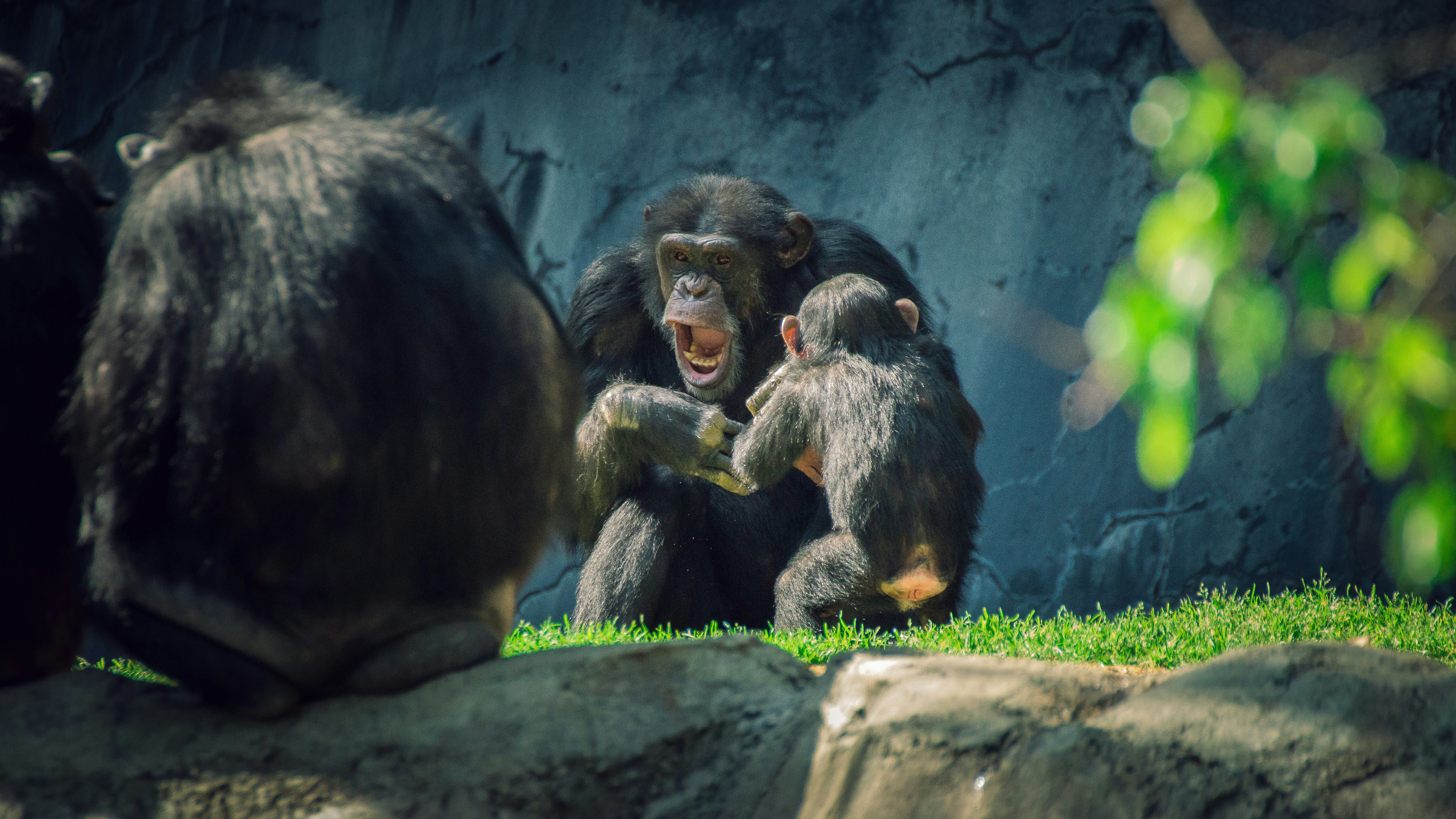


Like human toddlers, they explore everything-from mud to butterflies. Young chimps are curious and intelligent. But they remain close to their mothers throughout their lives. When chimps are about eight or nine years old, they begin to leave “home” for a few days at a time. For the new study, the team recorded 29 incidents of monkey-eating by eight chimpanzees, and found that if the monkey was a juvenile, the chimps first went for the head 91 percent of the time. This baby has jumped into its mother’s arms to keep from getting too wet. Yet, for some reason, they usually stay out in the open during a downpour. Since baby chimpanzees cant eat solid food, they rely on their mothers milk.
#Chimpanzee baby eating how to#
By playing together, youngsters learn how to act in chimp society.Īll chimps hate rain. Young chimps love to wrestle and chase each other through the trees. But, like the common chimp, the shape of its face changes, too. The shape of its face also changes-it grows longer, and the mouth and chin get bigger.Ī bonobo is born with a dark-skinned face. Python vs Monkey - Mother Monkey Eaten By Python - To Save Her CubsA non-venomous snake found in Asia, Africa, and Australia is the Python. In this picture, a mother chimp tickles her baby.Ī common chimpanzee is born with a pale, pinkish-yellow face. Young chimps like to be tickled, and they laugh when someone tickles them. If a baby loses its grip or slips, it just whimpers softly and its mother quickly holds it close. A momma chimpanzee and her newborn baby had a tearful reunion at the Sedgwick County Zoo in Wichita, Kansas, after being separated for nearly two days following complications from delivery. But it can grip tightly to its mother as she moves from place to place. They learn many of these skills by playing.įor the first three months of its life, a chimp baby is quite helpless. They need to learn how to get around on their own, how to find food that is safe to eat, how to fight and display, how to make nests, and how to avoid danger. This is because they have a great deal to learn. Like human children, chimps take a long time to grow up. One day for no reason he attacked one of his carers and proceeded to eat her nose. Baby chimps are known to nurse for around 5 years. Welcome to our channel Here youll learn about every animal here at the Myrtle Beach Safari & get familiar with everyone who dedicates their lives to these. It will drink its mother’s milk and share her nest until it is weaned at four or five years old. The story of Travis the chimpanzee who was 14 year old and weighed 240lbs. Before they are old enough for solid food, infant chimpanzees rely on breast milk from their mothers.

A female chimp could give birth to as many as five infants in her lifetime, but it’s more likely that she will raise a maximum of three.Ī baby chimp weighs three to four pounds at birth. They even let the babies jump on them!Ĭhimps usually have only one baby every five or six years. Older chimps tolerate a lot of mischief and teasing from infants. The whole community is excited when a baby is born. They even seem to plan out ways to tease the others at times.Chimps love babies. However, when he finally hits the wall, he literally falls where he is and doesn’t wake up until morning light! Ace and ‘brother’ Nnamdi are similar in their boyish activity levels so they make a great pair as part of the youngest nursery group, often playing chase and looking for fun. At bedtime, after everyone else has fallen fast asleep, Ace is wide awake, wanting more and more tickles and racing around finding trouble wherever he goes. Ace is a vibrant and active little boy – he is rough and tumble and never seems to tire. Today, Ace continues to grow and develop both physically and mentally each and every day and his true personality is really shining. Finally, Ace seemed to turn a corner and begin to gain weight, eat more, and become more active. We had to really boost his immune system with extra nutrition and care and work on getting him to eat more, offering special foods in creative ways and many times a day. Even after a lot of TLC and excellent care, Ace was slow to gain weight and strength. Ace came to LCRP extremely thin and weak, struggling greatly to survive.


 0 kommentar(er)
0 kommentar(er)
